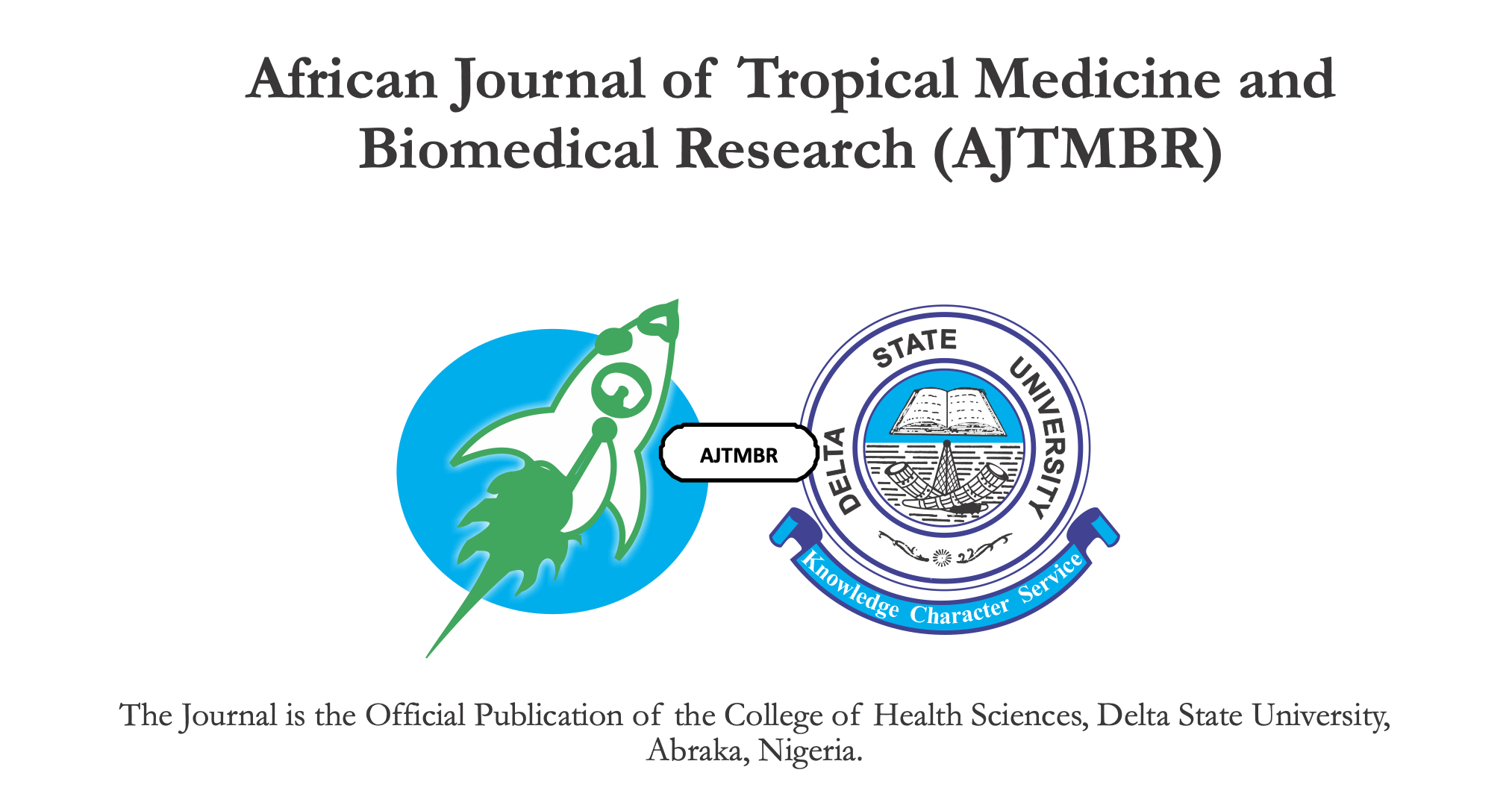Impact of Free Maternity Service on Caesarean Acceptance and Perception in Delta State. South South Nigeria
Keywords:
Free maternity service, Caesarean sectionAbstract
Background. Although the Increasing rate of Caesarean section has remained a source of concern in different part of the world, it nevertheless remains an important intervention in the reduction of maternal and perinatal mortality during childbirth. Women in developing countries remain averse to caesarean section. The contribution of cost to caesarean section acceptance and perception is not clear.
Aims. To determine the impact of cost-free maternity service on caesarean section acceptance and perception in Delta State. Setting and design. A cross-sectional descriptive study.
Subjects and Method. A structured questionnaire was administered to a total of 600 consenting antenatal women, in two secondary health facilities in Delta State, Eku Baptist Government Hospital(EBGH) and Central Hospital Warri (CHW).
Statistical Analysis. Statistical Package for Social Sciences version 24. With descriptive statistics for frequency, mean and standard deviation. Chi-square and student's t-test for comparison of variables. Level of significance set as p<0.05.
Results. There was no significant difference in the proportion of respondents that have had previous Caesarean section in the two centers, 20.6% and 20.9% at Eku Baptist Government hospital (EBGH) and Central Hospital Warri (CHW) respectively. Cesarean section was acceptable to a large number of the respondents, 60.6% and 68.3% at EBGH and CHW respectively. Average of 15.8% respondents will not accept cesarean section for any reason. Postoperative pain was the major reason of respondents' objecting to Caesarean section in both centers, 38% and 20.5% at EBGH and CHW respectively.
Conclusion. This study revealed a high level of caesarean section acceptance among pregnant women under free maternity service policy. The need for well informed and continuous health enlightenment during the antenatal visits is required to overcome the negative perception about CS.
References
Jaiyesimi, RA, Ojo OE. Caesarean section. In: Okonofua EF , Kunle O., Contemporary Obstetrics and Gynaecology for Developing countries, Women's Health and action Research Centre of Nigeria, Benin City. 2003; 259-619.
Hama KK, Johnson R. Caesarean Section: Techniques and Complication. Current Obtstetric and Gynaecology. 2002; 12: 65-72.
Betran AP, Merialdi M, Lauer JA, Bing-Shun W, Thomas J, Van Look P, et al. Rates of caesarean section: Analysis of global, regional and national estimates. Paediatr Perinat Epidemiol. 2007; 21:98-113.
Ibekwe PC. Rising trends in caesarean section rates: An issue of major concern in Nigeria. Niger J Med 2004; 13:180-1.
Igberase GO, Ebeigbe PN, Andrew BO. High Caesarean section rate: A ten year experience in a tertiary hospital In the Niger Delta. Niger J Clin Pract. 2009; 12(3):293-297
Adegeba RA, Danso KA, Adasu-Donkor A, Ankobea-Kokroe F. Awareness and perception of and attitudes towards caesarean delivery among antenatal. Ghana Med J 2008;42:137-40
Sunday-Adeoye I, Kalu CA. Pregnant Nigerian women's view of caesarean section. Niger J Clin Pract.2011;14:276-9
Ezeome IV, Ezugworie JO, Udealor PC. Beliefs perceptions,and views of pregnant women about caesarean section and reproductive decision making in a specialist health facility in Enugu, Southeast Nigeria. Niger J Clin Pract 2018;21:423-8.
Gunn JKL, Ehiri JE, Jacobs ET, Ernst KC, PettygroveS,Center Ke,etal.Analysisof the Data from the Healthy Beginning Initiative. PLoS 2017;12,e0174369. https://doi.org/ 10.1371/ journal.pone. 0174369
Aziken M, Omo-Aghoja L, Okonofua F. Perceptions and Attitudes of pregnant women towards Caesarean section in Urban Nigeria. Acta Obstretica et Gynaecological Scandinavica. 2007;86:42-47
Orgi EO, Ogunniyi SO and Onwudiegwu U. Beliefs and Perception of pregnant women at Ilesa about Caesarean Section. Tropical Journal of Obstetrics and Gynaecology. 2003; 20:141-143

Downloads
Published
Issue
Section
License

This work is licensed under a Creative Commons Attribution-NoDerivatives 4.0 International License.
Key Terms:
- Attribution: You must give appropriate credit to the original creator.
- NonCommercial: You may not use the material for commercial purposes.
- ShareAlike: If you remix, transform, or build upon the material, you must distribute your contributions under the same license as the original.
- No additional restrictions: You may not apply legal terms or technological measures that legally restrict others from doing anything the license permits.
For full details, please review the Complete License Terms.



